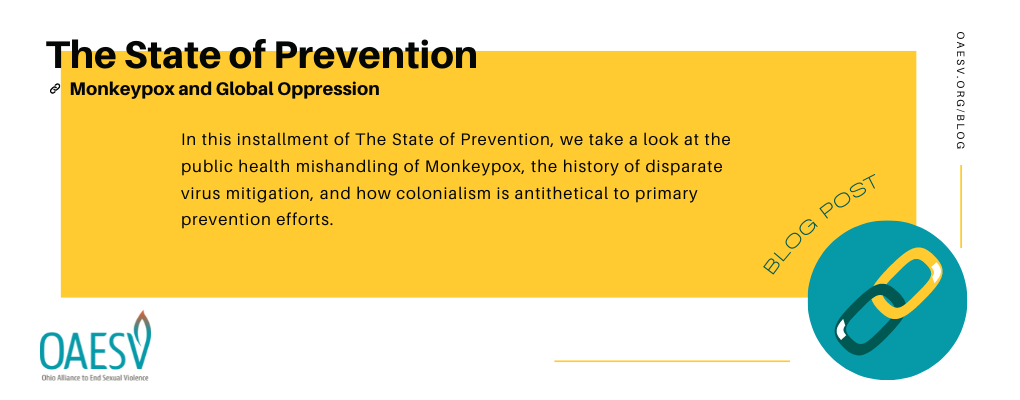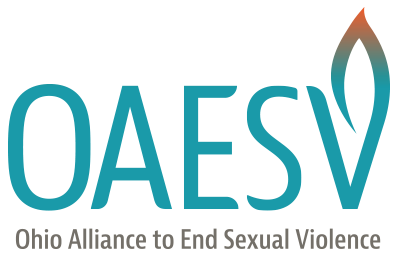
Monkeypox and Global Oppression
The Cycle Continues: Monkeypox and Global Oppression
By: Sarah Ferrato, Caitlin Burke
Nearly four months ago, the first case of Monkeypox (MPV) was reported in the United States. According to the CDC, there are currently over 25,000 reported cases in the US, District of Columbia, and Puerto Rico that account for nearly 40% of the global total. While a decline in recent infection reports provides optimism for containment, the ripple effects of colonialism, racism, homophobia, transphobia, and whorephobia remain.
Proximity and deservedness are often unspoken features of America’s public health investment. Much like the Eurocentric disinformation that claimed the spread of Human Immunodeficiency Virus (HIV) began in the 1980s, our public health response and general understanding of MPV revved up in 2022 when it began to impact white communities in Europe and the United States. While there has been knowledge of MPV’s human infection characterization beginning in 1970, primary prevention was not of utmost concern partly because it remained in the Congo, spreading to Nigeria throughout the 70s, and fatal primarily in Congolese children. These infections were not happening on a large scale in Europe or America and were not killing white children. And despite the understanding that travel between colonial and colonized areas has sustained, there has been little concern about its potential for spread. This kind of Eurocentric framing of public health need reinforces colonial attitudes toward countries, such as those found on the continent of Africa, that diseases and poverty are the expected way of life. And a similar attitude has been adopted by colonized societies toward Black people across the diaspora. Diasporic “othering” even more deeply impacts queer communities of color, which is unsurprisingly reflected in MPV infection rate disparities in Black and Latine men throughout the United States.
Proximity and deservedness extend even to vaccine prioritization, as we’ve seen in the lopsided rollout of the MPV vaccine. While Black and Latine men are disproportionately impacted by MPV, they are receiving a far lower share of vaccinations, mimicking a similar pattern to COVID-19 vaccine rollouts.
A combination of barriers to access and historical mistrust of medical systems only partially account for the vaccine distribution disparity. We must also account for the mishandling of public health messaging, the federal vaccine stockpile, and lack of urgency to proactively mitigate spread—including appropriate public health investment— that have contributed to an increased “othering” of disproportionately impacted communities.
Under colonial rule, viruses spread based on forced labor and expanding infrastructure with little concern for the health and well-being of the exploited peoples. Coupled with the suppression of education, colonists left African countries with little to no medical infrastructure, while travel to and from these countries continued. Exploited communities are seen as a tool of colonial expansion, not of individual and collective humanity interconnected to the humanity—and health—of all people. Exploited communities are seen as a tool of colonial expansion, not of individual and collective humanity interconnected to the humanity—and health—of all people. So, it can be argued that because communities living on the continent of Africa were viewed as less human, medical intervention and prevention efforts of MPV were overlooked or dismissed until the spread began impacting dominantly white countries.
Proximity and deservedness now extend into our Eurocentric and ethnocentric attitudes toward communities of color and queer communities across the diaspora. While the origins of MPV were found in rodents, the World Health Organization has dragged its proverbial feet in renaming the virus to a less stigmatizing and racist name. One would imagine that public health officials learned an imperative lesson from persistent media references to COVID-19’s apparent origins in Wuhan, China, which spurred a steep uptick in racially motivated violence against Asian communities, and yet the name endures.
The US government and leading public health officials continue to mishandle risk mitigation and transmission messaging that has led to the misunderstanding of MPV as a sexually transmitted infection (STI) and impacting only men who have sex with men. There have been limiting and unclear qualifications to receive preventive vaccinations, prioritizing cis men who have sex with cis men and deprioritizing intersecting at-risk populations including sex workers, trans women, and nonbinary people. And while we’ve known about MPV for decades, , disproportionately impacting those who rely on physical labor and sex as commodities for survival under capitalism.
Communities of color and queer people have endured historical exploitation and violence throughout the globe, and our public health response continues to uphold these modes of power and control with misguided and potentially dangerous messaging about its transmission that exclude non-sexual transmission considerations. At a time when the word “grooming” is being used as a tool to drive anti-LGBTQ+ legislation and imply that children can only become infected through sexual violence, it is imperative that public health messaging about a virus that has many modes of transmission is named as such. To focus solely on its sexual transmission among men who have sex with men may have violent impacts as MPV spreads to all communities.
So, what does this have to do with Ohio’s sexual violence prevention field? In short, everything. Primary prevention through an anti-oppressive lens requires us to expand our scopes beyond explicit sexually violent behavior and consider the interconnectedness of all violence on all our communities. It requires us to expand our scopes beyond our state and consider the national and global implications of public health prioritization or deprioritization, which directly relates to the risk and protective factors we are called on to focus in our violence prevention work.
Primary prevention from an anti-oppressive lens requires us to see beyond imagined borders that limit our scopes to proximity and deservedness, creating a hierarchy of care and support that is antithetical to our vision of a world free from violence.
“The State of Prevention” is a blog series that explores Ohio’s prevention landscape, highlighting both history and current events that impact the field.
References:
2022 U.S. Map & Case Count; Center for Disease Control and Prevention, https://www.cdc.gov/poxvirus/monkeypox/response/2022/us-map.html
A Viral Colonial Legacy: HIV, Monkeypox Emerged Due to Ongoing Colonial Viral Neglect; Ngofeen Mputubwele, Joseph Osmundson, PhD; https://www.contagionlive.com/view/a-viral-colonial-legacy-hiv-monkeypox-emerged-due-to-ongoing-colonial-viral-neglect
Accusations of ‘grooming’ are the latest political attack — with homophobic origins; Melissa Block, https://www.npr.org/2022/05/11/1096623939/accusations-grooming-political-attack-homophobic-origins
Critics say ‘monkeypox’ is a racist name. But it’s not going away anytime soon; Bill Chappell; https://www.npr.org/sections/goatsandsoda/2022/08/01/1113908154/critics-say-monkeypox-is-a-racist-name-but-its-not-going-away-anytime-soon
Covid ‘hate crimes’ against Asian Americans on rise; Sam Cabral, https://www.bbc.com/news/world-us-canada-56218684
How Monkeypox Went From Containable to Crisis; Sabrina Tavernise, https://www.nytimes.com/2022/08/01/podcasts/the-daily/monkeypox-vaccine-treatment.html
In fight against monkeypox, racial disparities emerge; Priyanka Dayal McCluskey, https://www.wbur.org/news/2022/09/23/monkeypox-racial-disparities-vaccines-infections
Meet the Sex Workers on the Front Lines of the Fight Against Monkeypox; EJ DICKSON, NIKKI MCCANN RAMIREZ, https://www.rollingstone.com/culture/culture-features/monkeypox-vaccine-sex-work-1390768/
Monkeypox Appears to Recede, but Risks and Uncertainties Linger; Apoorva Mandavilli, https://www.nytimes.com/2022/09/26/health/monkeypox-vaccine.html
Monkeypox (MPX) Cases and Vaccinations by Race/Ethnicity; Nambi Ndugga, Sweta Haldar , Drishti Pillai, Latoya Hill, Samantha Artiga, https://www.kff.org/racial-equity-and-health-policy/issue-brief/monkeypox-mpx-cases-and-vaccinations-by-race-ethnicity/
Risk & Protective Factors; National Sexual Violence Resource Center, https://www.nsvrc.org/sites/default/files/publications/2019-07/Risk%20%26%20Protective%20factors_Final508.pdf
The new U.S. monkeypox vaccine strategy offers more doses — and uncertainty; Pien Huang, https://www.npr.org/sections/health-shots/2022/08/19/1118329835/the-new-u-s-monkeypox-vaccine-strategy-offers-more-doses-and-uncertainty
Why Black And Latino People Still Lag On COVID Vaccines — And How To Fix It; Nina Feldman, https://www.npr.org/sections/health-shots/2021/04/26/989962041/why-black-and-latino-people-still-lag-on-covid-vaccines-and-how-to-fix-it
